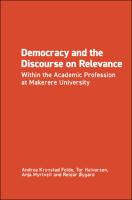Democracy and the Discourse on Relevance Within the Academic Profession at Makerere University
Author(s)
Felde, Andrea
Halvorsen, Tor
Myrtveit, Anja
Øygard, Reidar
Collection
ScholarLedLanguage
EnglishAbstract
Democracy and the Discourse of Relevance is set against the backdrop of the spread of neoliberal ideas and reforms since the 1980s, accepting also that these ideas are rooted in a longer history. It focuses on how neoliberalism has worked to transform the university sector and the academic profession. In particular, it examines how understandings of, and control over, what constitutes relevant knowledge have changed. Taken as a whole, these changes have sought to reorient universities and academics towards economic development in various ways. This includes the installation of strategies for how institutions and academics achieve recognition and status within the academy, the privatisation of educational services and the downgrading of the value of public higher education, as well as a steady shift away from the public funding for universities. Research universities are increasingly adopting a user- and market-oriented model, with an emphasis on meeting corporate demands, the privileging of short-term research, and a strong tendency to view utility, and the potential to sell intellectual property for profit, as primary criteria for determining the relevance of academic knowledge. The privatisation of education services and the reorienting of universities towards the needs of the ‘knowledge economy’ have largely succeeded in transforming the discourse around the role of the academic profession in society, including in many African countries. Makerere University in Uganda has often been lauded as an example of successful transformation along neoliberal lines. However, our research into the working lives of academics at Makerere revealed a very different picture. Far from epitomising the allegedly positive outcomes of neoliberal reform, academics and postgraduate students interviewed at Makerere provide worrying insights into the undermining of a vibrant and independent academic culture. The stories of the ordinary academics on the ground, the empirical focus of the book, are in contrast to the claimed successes of the university; and the official stories of the university leadership and administration paint a picture of an academic profession in crisis. With diminishing influence on deciding what is relevant knowledge and thus on processes of democratization of their own institution and society, academic freedom is also losing its value. This perspective from the ground-level exposes the many problems that neoliberal reforms have created for academics at Makerere, leaving them feeling disempowered, often reducing them to the status of consultants. We also show how a range of local initiatives are steadily increasing resistance to the neoliberal model. We consider how academics and others can further mobilise to regain control over what knowledge is considered relevant, and thereby deepen democracy. In so doing, we aim to highlight some responses and actions that have proven effective so far. Democracy and the Discourse of Relevance will hopefully help to change the systems that value knowledge in ways that are driving research institutions towards competitive and market-like behaviour. We also aim to contribute to contemporary debates about what knowledge is relevant.
Keywords
Democracy; discourse; higher education; knowledge productionDOI
10.47622/9781928502272ISBN
9781928502272, 9781928502272Publisher
African MindsPublisher website
https://www.africanminds.co.za/Publication date and place
Cape Town, 2021Classification
Higher education, tertiary education


 Download
Download Web Shop
Web Shop